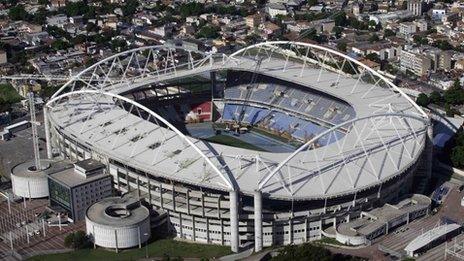Brazil tracks World Cup lessons for Rio Olympics
- Published
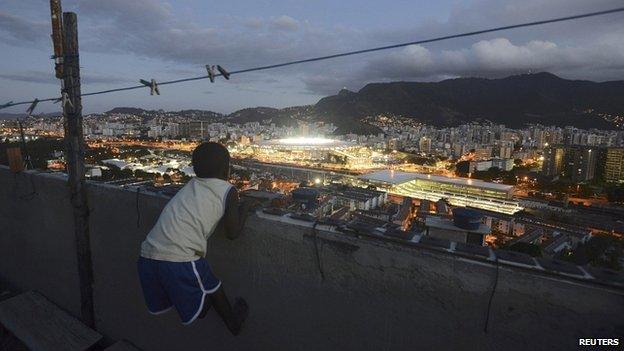
The eyes of the world will once again be on Rio de Janeiro in two years' time as it hosts the 2016 Olympics
The World Cup may be over, but in just two years' time Brazil will once again brace itself for an influx of huge numbers of visitors, sports fans and tourists for the Rio de Janeiro Olympics.
The 2014 tournament has generally been regarded as a success, in the face of many doubts inside and outside Brazil.
So what can the country learn from the experience that can help it to host its next major sporting event? BBC Brasil's Renata Mendonca looks at the lessons learned and the challenges ahead for Brazil.
Getting around
The hosts struggled to finish preparations in time for the World Cup, and 11 of the 12 stadiums used in the tournament missed deadlines set by Fifa.
The worst example was the Arena de Sao Paulo, the stadium for the opening match between Brazil and Croatia, which was only completed two weeks before kick-off.
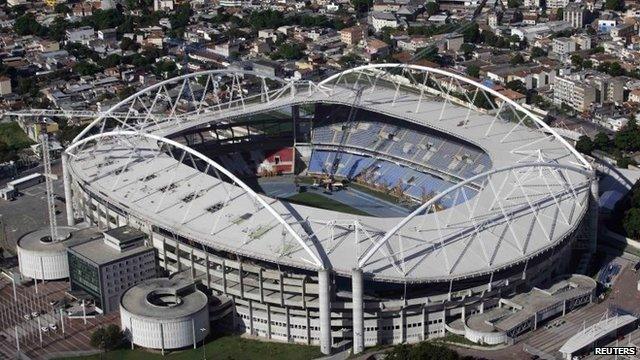
The Olympic stadium has been closed since last year for repairs, while some venues have yet to be built
The Brazilian government had also promised 83 infrastructure projects in the 12 host cities, including investment in airports and public transport.
At least 21 of these were postponed, with the government saying they will be delivered after the tournament. Others were only partially completed by the time the World Cup began, such as the airports in Salvador and Belo Horizonte.
Delays like this are the main concern for the International Olympic Committee (IOC), which has already warned Brazil about the need for greater urgency in the run-up to the 2016 Games.
According to local organisers, 38% of the venues for the Olympics are ready - 11 out of 29 that will be needed - and IOC officials may take comfort from the fact that, however late the stadiums were, the World Cup broadly worked.
Language barriers
The most common difficulty cited by foreigners who came for the World Cup was that it was not easy to find people who spoke English or Spanish in Brazil.
When words did not work, the solution was trying non-verbal communication. Simple gestures had to suffice. And usually they worked out well.
"In the beginning, I thought language was a problem, but Brazilians are so nice they always try to help you and you can get away with it," Darren Heffernan, from England, told the BBC.
But language problems did sometimes get in the way of essentials - like eating out.
Restaurants tried to adapt their menus to satisfy international customers, but using literal translations taken from the internet did not always work.
"Horse steak" did not really convey beef with a fried egg on top and sounded a lot less appetising, while "against the file" for sirloin steak did not quite stir the taste buds either.
Diversity in stadiums
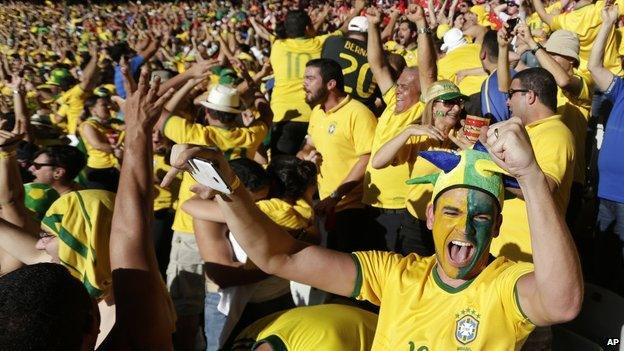
Diversity in stadiums did not appear to represent the government's vision
"It's a very mixed society on all fronts - religion, race, ethnicity. We can push forward a vision of a nation that is tolerant and diverse and welcoming," Brazilian Sports Minister Aldo Rebelo said in 2012.
This was the message Brazil wanted to sell when hosting the World Cup and the Olympics: the idea of a diverse and multicultural country.
This diversity was striking when travelling around the country during the World Cup. But for those who only visited stadiums during the tournament, they did not appear to represent the government's vision.
Tickets for the World Cup were considered expensive by many Brazilians and out of their reach. Prices ranged from around $30 to $990. The minimum monthly wage in Brazil is $325.
The proportion of people living in poverty in Ceara state, whose capital, Fortaleza, hosted seven World Cup matches - including two Brazil games - is as high as 31%.
The spectators in the stands were mainly wealthier white Brazilians, and that attracted some criticism from sections of the Brazilian and international media.
Brazil will have another opportunity to showcase its diversity two years from now, and making cheaper tickets more widely available may help.
Booing opponents
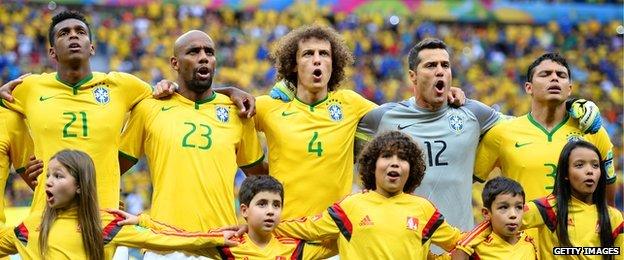
The Brazilian anthem created unity between players and fans, but supporters did not like to share the spectacle
The entire Brazilian team singing the country's national anthem before matches was always a special moment, with the team joining tens of thousands of Brazilian fans - as well as the mascots - to repeat the entire anthem, after the musical accompaniment had stopped.
South American fans, including those of Chile, Argentina and Colombia, copied this for their own anthems.
But home supporters did not appreciate this imitation as the sincerest form of flattery, and when Brazil faced Chile in the round of 16 they booed their rivals during their anthem.
The attitude was considered disrespectful and widely criticised by Brazilians on social media.
Protecting a million visitors
Security was always considered a key challenge for Brazil in hosting the World Cup and the Olympics.
A developing country with crime rates higher than those of European nations needed to prove that tourists would be safe walking on its streets during the event.
In reinforcing security in the 12 host cities by integrating state and federal police, the authorities accomplished their aim of assuring the safety of a million foreign tourists who came to the country during the World Cup.
For the final in Rio de Janeiro, more than 25,000 police officers were involved in the security operation around the city and locals told the BBC they had never felt so safe - at least for one day.
Crowd control
Brazil had to deal with massive protests during the Confederations Cup last year and the authorities took a number of measures to avoid the same problems during the World Cup.
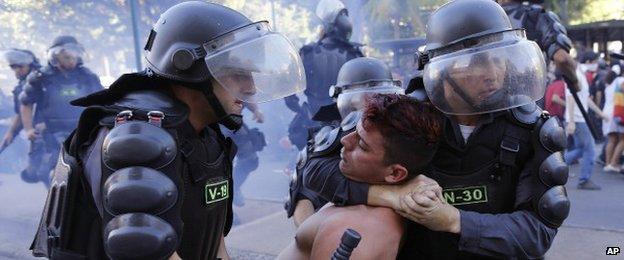
Protests continued right up until the final in Rio, but on a smaller scale compared with last year
The first was to establish a police perimeter of 2km around stadiums. Only fans with tickets or accredited media and officials were able to get into that area.
This was an attempt to keep protests away from the stadiums and it succeeded in all 12 host cities.
There were some demonstrations but on a much smaller scale compared with a year ago. The biggest ones took place in Sao Paulo and Rio, hours before the opening and the final matches.
Although there were only hundreds of protesters - not thousands like in 2013 - violent confrontations with police were reported, with at least two journalists injured and dozens arrested.
More protests are planned before the Olympics, and crowd control remains a challenge for the authorities.
Accommodation for fans on low budgets
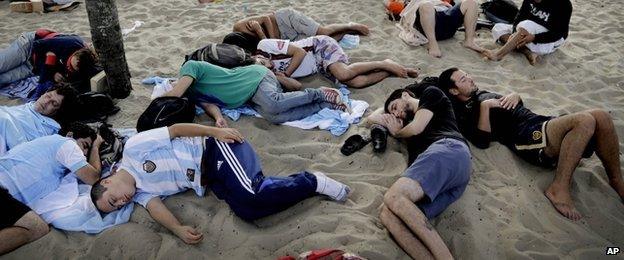
Latin American fans arrived in huge numbers in Brazil, many without accommodation
The massive influx of fans from all over Latin America was a phenomenon during this World Cup, with thousands of them flooding into Brazil by car, on very low budgets.
The solution was to accommodate them in improvised campsites provided by local authorities in the host cities.
More than 4,000 Chileans camped in the Sao Paulo Sambadrome, where the city's annual carnival is staged.
They had tried to do the same in Rio, but "there were not enough parking spaces provided", they told the BBC.
Argentine fans were more fortunate when they arrived in huge numbers for the final in Rio.
Local authorities opened up the Sapucai Sambadrome - Rio's even more glamorous carnival venue - but there were those who preferred to stay around Copacabana beach and filled Avenida Atlantica, the most famous street in Rio, with their cars and motor homes.
Eduardo Paes, the mayor of Rio, has admitted that the city will need to make some adjustments before the Olympics. "I would love to see this invasion of Latin Americans again but we need to be more prepared to welcome them," he said.
A lasting legacy?
BBC Brasil has asked dozens of Brazilians in Sao Paulo and Rio in the past week what they thought the legacy of this tournament would be. They always needed a few minutes to come up with an answer. Most of them said: "There is no legacy."
One Rio resident, Jeferson, said: "The so-called legacy will only be acknowledged by Brazilians when the infrastructure projects that were promised for the World Cup are delivered."
Whether attitudes harden or soften in the next two years will depend, it seems, on those projects being completed.
Rio is promising improvements in public transport, including new metro lines and the development of a bus rapid transit system.
Another concern is the clean-up operation in Jacarepagua and Barra Lagoon, where the Olympic sports complex will be housed.
"We want this to be ready by 2016, but the most important thing is that it is ready for the people who have been waiting for 40 years," Rio state governor Luiz Fernando Pezao said.
More than a football nation
Brazil is best-known for its football - despite the poor form of the hosts on the field at this tournament - but one of the main aims for the country in hosting the Olympics is to become a nation of sports.
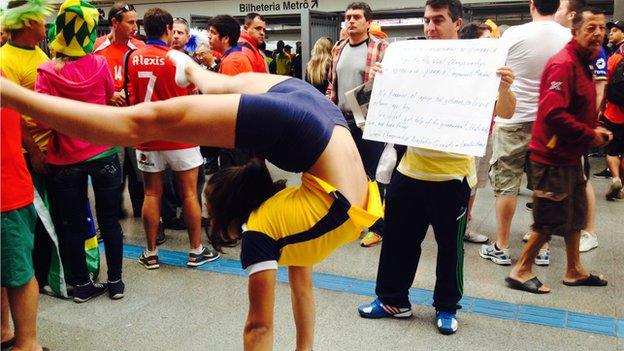
This gymnast attempted to raise money from football fans in Sao Paulo to compete at Rio 2016
With this in mind, the federal government has invested more money in other Olympic sports.
A project called Medal Brazil was created, aiming to make the host nation one of the top 10 countries in the 2016 medal table. It includes an extra investment of around $450m in Olympic sports between 2013 and 2016.
However, Olympic athletes still complain about the lack of investment in their sports.
A poignant example of this came during the World Cup, when fans on their way to the stadium in Sao Paulo to watch Chile against the Netherlands passed a gymnast who was performing to try to raise some money to compete in the World Championships. Her dream is to be an Olympic athlete at Rio.
Additional reporting by Stephen Fottrell.
- Published16 July 2014
- Published12 July 2014
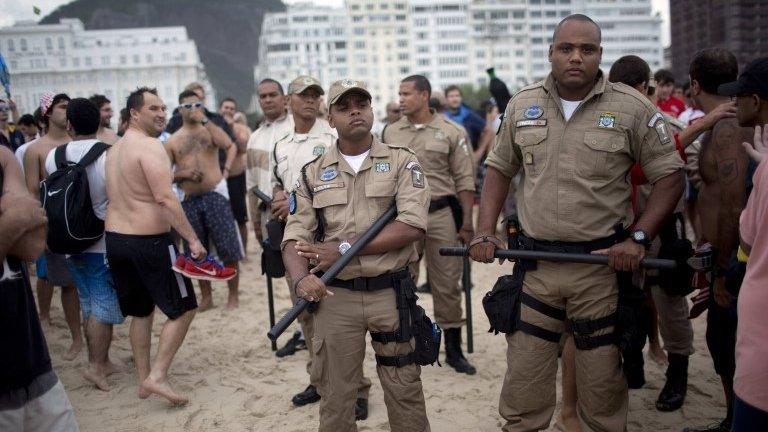
- Published13 June 2014
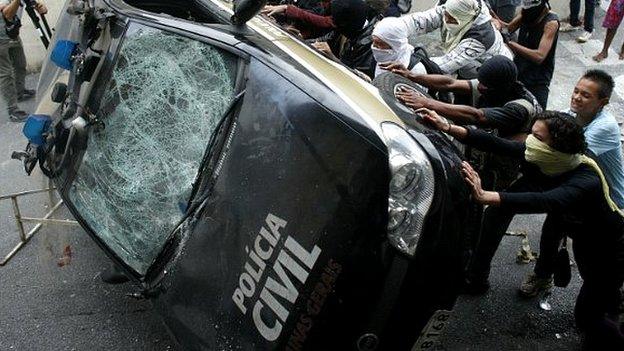
- Published10 June 2014
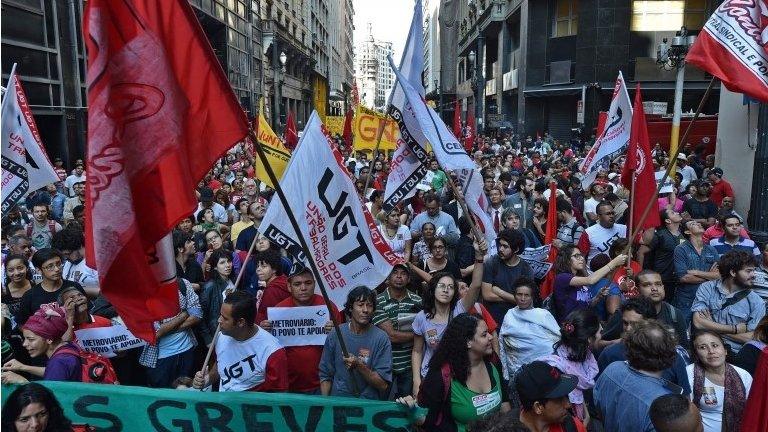
- Published8 June 2014
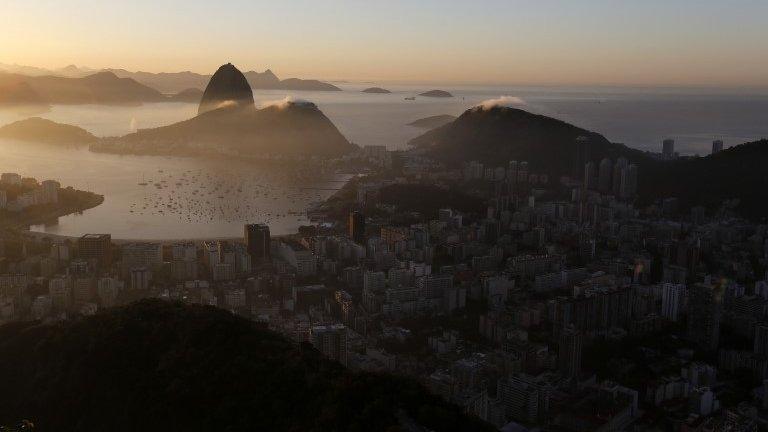
- Published7 June 2014
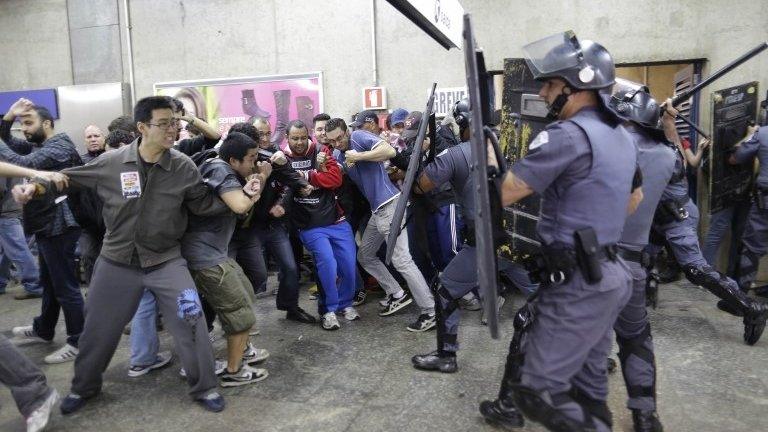
- Published30 April 2014

- Published10 April 2014
